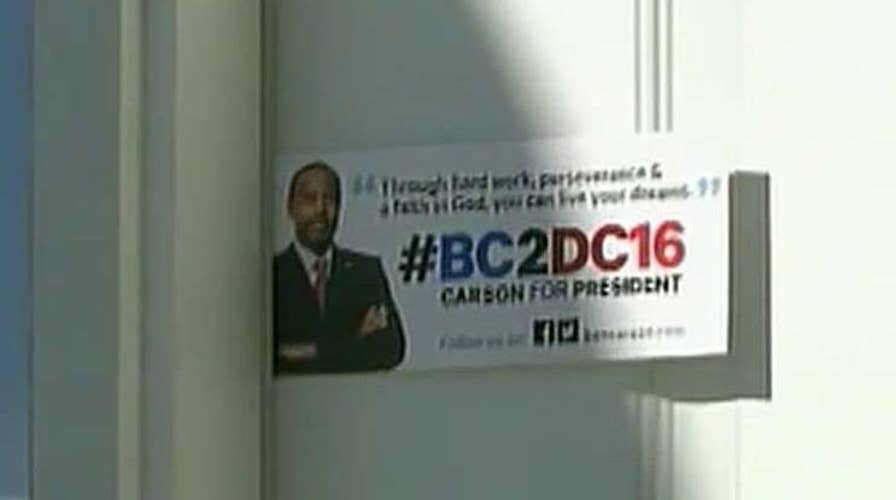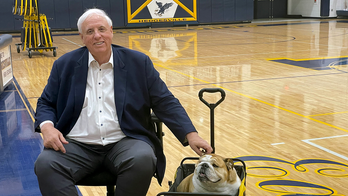In-depth look at candidates 'ground game' in Iowa
John Roberts reports on how campaign staff drum up support for their candidates
DES MOINES, Iowa – Going into the Iowa caucuses in 2012, Rick Santorum trailed Mitt Romney by 5 points. Yet when all was said and done – and it took two weeks to figure it out – Santorum prevailed, beating Romney by one-tenth-of-one-percent.
How did he make up the deficit on caucus day? With an extensive ground operation that brought out 29,839 very motivated supporters.
Fast forward to 2016. With 11 candidates still in the race, there is more pressure to identify people who will put on their hat, coat and gloves on a cold Iowa night, warm up the car and spend three to four hours talking politics. With less than a month to go until the caucuses, many of the campaigns are significantly ratcheting up those ground games.
The Iowa caucuses are not your typical voting day. They require serious commitment, said Craig Robinson, who ran the Republican caucuses here in 2008.
“This isn't just vote on your way to work or on your way home at night,” he said. “You’ve gotta show up at a certain time, gotta sit through a meeting and gotta vote so you're gonna have to do some work to get people to turn out.”
The campaign rallies, town halls, diner visits and living room meet-and-greets emblematic of Iowa politics are just part of the equation. That’s where the campaigns begin to identify possible supporters. Attendees are given campaign literature and asked to fill out contact forms. All that information goes into a database the campaign will repeatedly use to get those voters back out to events and, if the stars align just right, show up on Feb. 1 to caucus for their candidate.
“What we're doing is we're doing phone calling, we're doing mail drops and we're doing door knocks,” said Tim Albrecht, who is helping run Jeb Bush’s ground game. “We are contacting everybody who is a possible Jeb supporter and we're going to make sure they turn out on caucus night.”
Bush volunteers walk the snowy neighborhoods here armed with smartphone apps that pinpoint the homes of potential voters. In this digital world, the campaigns have amassed a staggering amount of information on every registered voter in Iowa.
“Digitally, everybody leaves a footprint,” said Albrecht. “So you’re able to identify those most likely to caucus and support Jeb Bush.”
Bush, who at one point led the Iowa polls, is now scrambling to stay alive here. Last week, his campaign pulled down all its advertising in Iowa, diverting that money to the ground game. Bush plans to triple his staff here.
The game to beat – at the moment – is Ted Cruz. His campaign boasts having thousands of volunteers, and has a 48-room dormitory in Des Moines to accommodate some 500 volunteers who are coming in from out of state to campaign for him. Cruz has contracted a private call center -- Campaign Headquarters in Brooklyn, Iowa – to do telephone voter outreach and has at his disposal the campaign ground operations of Iowa Rep. Steve King and conservative leader Bob Vander Plaats, both of whom have endorsed Cruz. And Cruz appears to have a lock on Christian conservatives, the most reliable of caucus-goers.
Eric Woolson, who ran Mike Huckabee’s campaign in Iowa in 2008, thinks the caucuses are Cruz’s to lose.
“It may be close between he and Trump, but I still think he is going to win and it will be on the strength of the Christian Coalition bringing in a few of those who are more anti-establishment voters who are really not happy with what's going on in Washington,” he said.
The anti-establishment voter is Donald Trump’s bread and butter. They come out to see him by the thousands in Iowa – some of the biggest crowds the caucuses have ever drawn. But many of those voters have never caucused before, presenting a challenge.
“While someone like Ted Cruz appeals to the activist. Someone who goes to the caucus on a regular basis, Trump appeals to someone who caucus is a complete foreign word to them,” said Robinson. “It's a heavier lift for the Trump campaign to get their people out. The advantage Trump has is he has the highest ceiling of all the candidates. He has broad appeal. That's great.”
Also in Trump’s favor, his Iowa operation is run by Chuck Laudner, who helped Santorum surge from behind to victory four years ago. But there is a lot the Trump campaign isn’t saying about its ground game.
For example, they won’t say how many precinct captains they have signed up. Top campaigns will have a captain at every one of the 1,681 caucus sites to speak for their candidate and sell him or her to the participants. All Trump’s campaign would tell Fox News is that they now have 17 paid staffers in Iowa and promise they’ll have captains at every caucus site on Feb. 1.
Marco Rubio’s campaign, which has taken some heat for its perceived lack of organization, announced Tuesday 300 county chairs in northwestern Iowa, Cruz’s biggest base of support. Rubio is attempting to appeal to the same values voters Cruz is courting, but it is difficult to get a handle on how Rubio’s ground operation measures up. His campaign won’t talk much about specifics, saying they don’t want to unduly raise expectations.
But all of this pales in comparison to what the Democrats are doing. Bernie Sanders has more than 100 paid staff in Iowa. Hillary Clinton has even more. Both have already locked in captains for every caucus site. Going back to the days of Tom Harkin campaigns, Democrats have always relied heavily on a massive ground operation to get out the vote.
“For the life of me I don't understand why the Republicans don’t invest as much in organization as the Democrats do,” Brad Anderson, who ran Iowa for President Obama in 2012, told Fox News. “Why wouldn’t they invest more in organizing so they can get those verbal commitments from Iowans that they are going to be showing up to support them on caucus night. It’s a real missed opportunity.”
As Santorum proved in 2012, a good ground game can make up for a significant deficit in the polls, but whether it could propel a 4th or 5th place candidate to a win is another matter. Then there’s the question of just how much the ground game here really matters to the bigger primary picture -- something to ask Santorum and Mike Huckabee, who both won Iowa but lost the nomination.
Then again, it worked for President Obama.

























